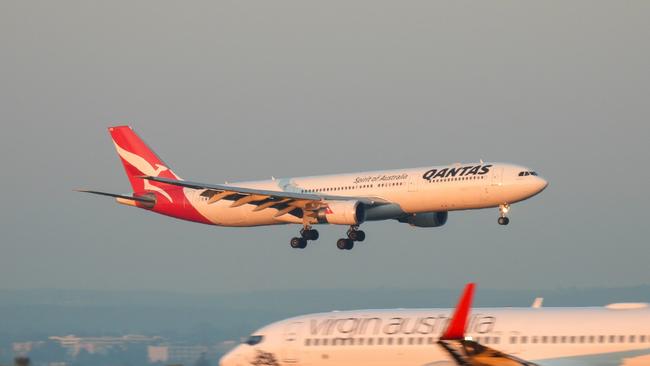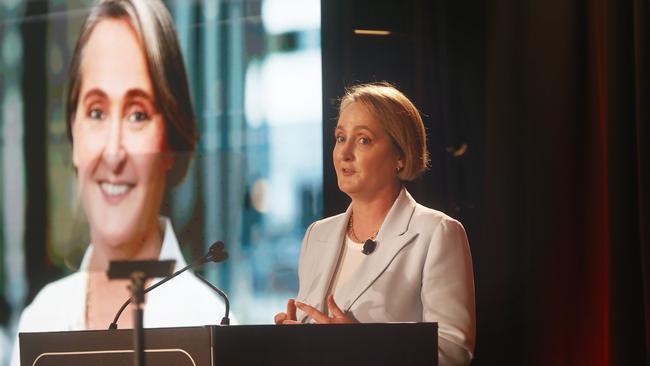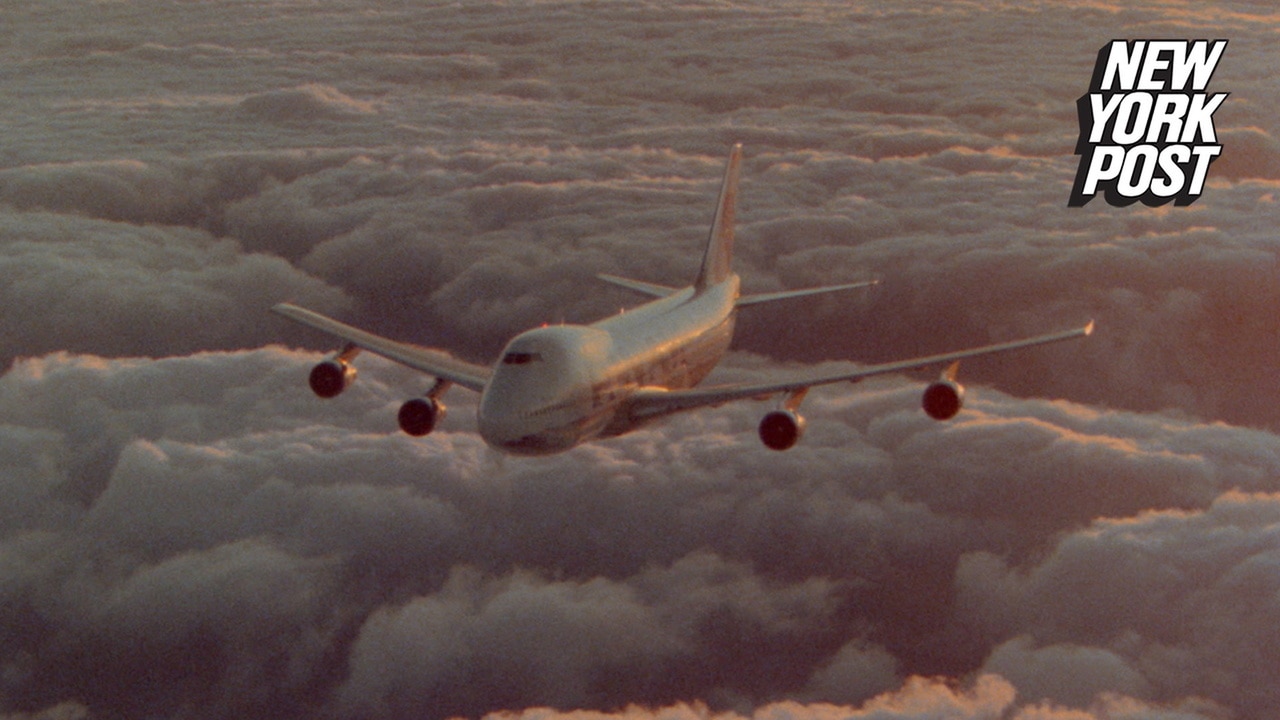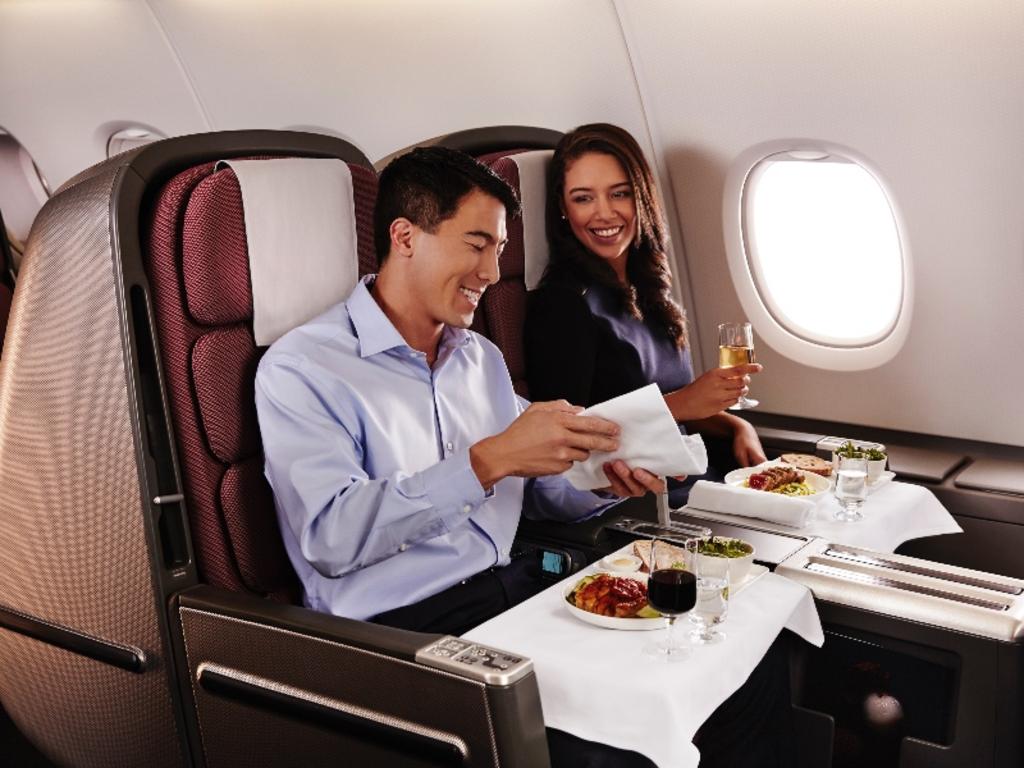Biggest problem for Qantas in 2025: Where to hide the cash
Vanessa Hudson will spend 2025 trying to restore Australia’s impression of Qantas, even as the airline rakes in the profits from domestic flyers.

Business
Don't miss out on the headlines from Business. Followed categories will be added to My News.
In the anti-woke world arising from the second coming of Donald Trump, writing about a company losing its social licence seems out of touch.
And yet Qantas – once the wokest of them all – has. And as wafty as “social licence” might sound, losing it is causing a multitude of problems that chief executive Vanessa Hudson will need to focus on fixing in 2025.
The term social licence refers to the acceptance of a company’s business practices by a community or stakeholders such as staff and government.
Former boss Alan Joyce put Qantas’s through the shredder by illegally firing staff, selling airfares on cancelled flights, making refunds impossible, failing to get flights away on time and losing customers’ baggage. The airline then successfully lobbied the Australian government to deny major rival Qatar more flights – even though international airfares were at record highs – while simultaneously (and supposedly by coincidence) backing Prime Minister Anthony Albanese’s “yes” campaign for an Indigenous voice to parliament by painting the airline’s support on aircraft tales.
Now Joyce is gone and Hudson is hoping she can start 2025 with a clean slate.
But first she must pay for the sins of the past, starting with staff – which make up on average about 30 per cent of the airline’s costs.
Qantas line-maintenance engineers and short-haul pilots are playing hardball with the airline as they try to lock in better deals on pay and conditions.
Now there is “a real opportunity to fix this once and for all”, wrote one pilot in a group chat about the enterprise bargaining negotiations.
The pilots and the engineers both know that Hudson can ill afford major industrial action while Qantas is working hard towards restoring customer and government confidence.
Significant strike action would look particularly bad when the airline is raking in blockbuster earnings off staggeringly high airfares.
The airline has just produced its two biggest underlying profits on record, of $2.46bn in 2023 and $2.08bn in 2024.

Tony Dillon, former Qantas head of strategy and now aviation consultant, said the airline had the exact problem every business wanted to have.
“The biggest challenge for them will be trying to hide all the money,” he laughed, before cautiously adding, “not that they would really do that.”
“If the return on invested capital was awesome last year, then it will be spectacular this time around,” Dillon says.
Qantas’s return on invested capital was 57.9 per cent in 2024, down on the staggering 103.6 per cent in 2023 but still significantly above the aviation average.
A McKinsey report on ROIC for the years between 2005-2015 showed few airlines had even achieved a return on capital at all, with only two in the 20s and the next best being Ryanair and EasyJet on 14.1 and 12.5 per cent respectively.
“It’s nice for investors, but as the CEO it puts you under pressure … with governments, with airports (and staff). If they want to have a crack, it’s harder to fight,” Dillon says. “They can’t play the ‘poor’ card, they can’t play the ‘inflation’ card.”
Investors certainly have been having a nice time.
Qantas shares reached $9.50 in late January as the airline’s near-monopolistic strength in the domestic market saw it continue to reap super-sized earnings.
The Flying Kangaroo has been the one to benefit the most from the failure earlier this year of regional airline Rex, which tried and failed to take on Qantas and Virgin on the highly profitable Sydney-Melbourne-Brisbane routes, without the right aircraft or frequencies.
Qantas’s domestic strategy is undoubtedly impressive. When Geoff Dixon created low-cost unit Jetstar more than 20 years ago, his plan was to dominate the high-yielding business end of the market with Qantas and then make Jetstar the cheapest option for leisure travellers. That strategy has worked.
A report by the competition regulator earlier this year, before the collapse of Rex and Bonza, showed Qantas held 61.8 per cent of the domestic market, ahead of Virgin on 31.3 per cent and Rex on 5 per cent.
After its full-year results in October, Qantas told investors that revenue from domestic flights should rise by 2-4 per cent.
International is a trickier story. Qantas has at various times made massive profits off its international flights and other times run at a loss. Alan Joyce looked at selling the unit off during a tough time in his tenure but Qantas’s international network remains key to keeping its passengers hooked on its frequent flyer program.
At the moment, international is booming. Flights are full and the airline has come a long way to restoring its customer service – which took a battering in the first two post-Covid years.
The airline said it expected international revenue in the current half to drop 7-10 per cent as rival airlines added more capacity.

One of the biggest threats to Qantas at the front-end of the plane on long-haul will come from Qatar. The Doha-based airline has proposed buying 25 per cent of Virgin and using a ‘wet lease’ agreement to fly Virgin passengers on Qatar metal with Qatar staff.
Qatar is frequently recognised as having the world’s best business class product.
The deal received initial ACCC approval but is yet to receive sign-off from the Foreign Investment Review Board.
The backlash the Albanese government received when it blocked Qatar without providing a single consistent reason left many wondering if it was more to do with the close relationship between Anthony Albanese and former boss Joyce.
Whatever the real reason was back then, most expect the government will not block the Qatar Virgin deal now.
Investor Steve Johnson from Forager Funds says any impact of Qatar on international routes is more than offset by Qantas’s domestic money bath.
“I have a view that the concerns have been overblown considering the strength of the domestic business,” says Johnson, who is often a shareholder in Qantas but believes the current price is too high. “I don’t attribute a huge amount of value to the international business. It’s highly competitive and fluctuates between losing money and making money.”
In any case, he doesn’t “see people changing their behaviours” due to the strength of Qantas Frequent Flyer, which keeps them locked in to earning loyalty and status points.
The one area where Johnson does see an issue is the need for Qantas to replace its ageing fleet.
“They need to get on with it,” he says. “It’s costing a lot of money to keep flying those planes.”
Hudson has had an undoubtedly busy 2024 trying to solve problems not of her making. Her airline paid a $120m fine for the ghost flights scandal (selling tickets on cancelled flights), and a $120m fine to its illegally fired baggage handlers – with a further fine of as much as $100m to come from that act. She’s poured bucketloads of money into restoring the airline’s reputation with customers, and the customer service surveys suggest this efforts are starting to pay off.
What she would probably like most to see now is signed EBAs with her pilots and engineers. A sign for sure that she has worked out how to stick back together those pieces of Qantas’s shredded social licence.
More Coverage
Originally published as Biggest problem for Qantas in 2025: Where to hide the cash





